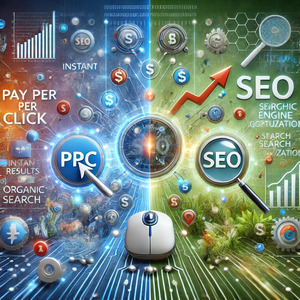PPC vs. SEO: Which Strategy Should You Choose for Your Business?
Cuerpo
For any digital marketing, businesses find themselves choosing between PPC and SEO. These two strategies have strengths and weaknesses, and the choice between them should be taken seriously for any business. Breaking it down so you know precisely how it works and its advantages and disadvantages are crucial to making that decision.
What is PPC?
The paid advertising model (PPC) is when the businesses pay for each click of the ads. The ads appear on the top of search engine results pages ( SERPs) or various social media platforms. The number one advantage of PPC is immediacy – at least with the words 'instantly' helping to sell this, these campaigns can start to drive traffic to your website almost immediately. As such, it's an appealing choice for companies using it to generate fast returns, particularly during product launches and promotional periods.
Moreover, PPC targets precisely. You can also target specific demographics, such as age, locality, interests, and behaviours. Tools like Google Ads allow you to monitor your campaigns as they happen and change your budget and targeting to work in your best interests. Suppose you're ready to shift to a professional PPC company in India that can help you create and run successful campaigns. In that case, it will be a precious investment on your part. But PPC is an ongoing investment. As soon as you stop paying for ads, the traffic spits back into your life, and your visibility in the search results disappears.
What is SEO?
In contrast, SEO optimises your website to rank higher in organic search results. This is about keyword research, creating high-quality content, fastening up websites, increasing user experience, and acquiring backlinks. SEO's most significant advantage is that it's cost-effective in the long run. However, once you reach a high ranking, it can take a few months to see results. Still, once you get there, you'll get a steady flow of organic traffic without paying a thing.
A top ranking will also build your credibility and trust. It has been found that people are more prone to press these organic search results than paid ads. Good search engine optimisation (SEO) helps improve user experience on your site, reduce bounce rates, and increase engagement; these are all good signs for search engines. Of course, the downside of SEO is that it's a work of ongoing effort and patience. However, this is not a "set and forget" strategy; it doesn't come with guarantees; you will need continuous optimisation and content creation to keep your rankings.

Choosing the Right Strategy
However, to decide between PPC and SEO, you need to consider consideration and timeline. PPC may be the way to go if you need immediate visibility, are launching a new product, or have a limited time to drive traffic. This can also give you quick insights into what keywords and messages please your audience. Many businesses consult a digital marketing advertising agency to determine how to best use both strategies to maximise impact.
The first point here is that investing in SEO is a good idea if you want your growth and sustainability to last. However, SEO will give you a more significant return on investment and better results over extended periods. A practical approach combines both strategies. Many businesses use PPC to quickly drive and continue working on SEO efforts to become visible in the long term. However, a digital marketing agency can help you develop a cohesive strategy incorporating both elements.
Conclusion
PPC and SEO are two essential techniques with their advantages and disadvantages. To do this, you must understand what's required to align your choice with your business objectives, what is available and who you aim at. You can achieve the best possible outcomes if you take an approach that works best for you, which is to say, if you use it to quickly drive initial traffic and create a solid online reputation in the future. Also, pay-per-click advertising can complement your SEO strategy, bringing traffic to your website while you work on long-term optimisation.












Comentarios